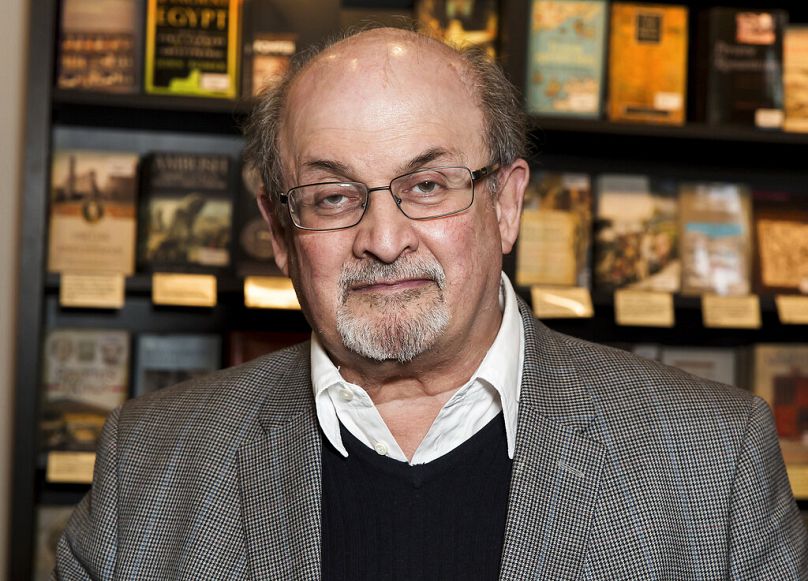The British author, who had a $3.3 million bounty on his head over accusations of blasphemy, is recovering, according to his agent.
Salman Rushdie is "on the road to recovery" according to his agent, two days after he was stabbed on stage.
 ADVERTISEMENT
ADVERTISEMENT
 ADVERTISEMENT
ADVERTISEMENT
The author of "Satanic Verses" -- which landed him with death threats -- is now able to talk and joke, after being on a ventilator in hospital.
Andrew Wylie, the British writer's agent, made the announcement Sunday afternoon, having said Rushdie will "probably lose an eye" and that his nerves and liver were damaged.
“Though his life-changing injuries are severe, his usual feisty and defiant sense of humour remains intact,” Rushdie's son Zafar said in a Sunday statement, thanking police, doctors and the "outpouring of love and support from around the world."
Police identified the attacker as Hadi Matar, 24, of Fairview, New Jersey. He is of Lebanese origin.
Matar pleaded "not guilty" to "attempted murder" at a US court on Saturday evening.
Rushdie, whose writing some Muslims consider blasphemous, was severely injured on Friday as he prepared to give a lecture in New York.
Matar was arrested at the scene, with the incident taking place shortly before 11 a.m. local time, and appeared in a New York court on Saturday wearing a black and white jumpsuit.
The motive for the attack -- which prosecutors called a "preplanned crime" -- remains unclear.
The attack on the 75-year-old sent shockwaves throughout the world, with world leaders and writers voicing messages of support and championing free speech.
The world-famous author was the target for more than 30 years of a fatwa by the late Iranian Supreme Leader Ayatollah Ali Khamenei over his work "The Satanic Verses", published in 1988.
UK prime minister Boris Johnson tweeted he was appalled that Rushdie had been attacked, "while exercising a right we should never cease to defend".
French satirical magazine Charlie Hebdo, which suffered an Islamist attack in 2015, said "nothing justified a fatwa."
Iran's state-controlled media have praised the attacker, who was immediately arrested and taken into custody, but did not assign a motive for the assault.
"Congratulations to this brave and duty-conscious man who attacked the apostate and vicious Salman Rushdie," writes Iran's ultra-conservative newspaper Kayhan. "Let us kiss the hand of him who tore the neck of the enemy of God with a knife".
However, ordinary Iranians told reporters at AP they feared the attack would further isolate Iran.
“This will negatively affect relations with many — even Russia and China," said Mahshid Barati, a 39-year-old Iranian geography teacher.
An AP reporter witnessed Matar storm the stage at the Chautauqua Institution in western New York state, attacking Rushdie in the neck and abdomen while he was being introduced.
The Indian-born author was flown to the nearest hospital and operated on urgently, New York State Police Major Eugene Staniszewski told reporters.
Baroness Lady D’Souza, a British politician who led the defence of Rushdie after the fatwa, said the incident highlighted the threats faced by writers across the world.
“It seems to me that there’s one important lesson here, which is no one anywhere should ever, ever, ever be threatened with death for writing a novel,” she told the BBC.
“Yet we seem to be living in a world, despite Salman’s fight, where that could well be a possibility.”
Rushdie's book “The Satanic Verses” has been banned in Iran since 1988, as many Muslims consider it to be blasphemous as it makes suggestions about the Prophet Muhammad's life.
Iran’s leader Ayatollah Ruhollah Khomeini issued a fatwa, or religious decree, calling for Rushdie’s death one year later, after the grinding, stalemate 1980s Iran-Iraq war decimated the country's economy.
A bounty of over $3 million has also been offered for anyone who kills Rushdie.
Iran’s government has long since distanced itself from Khomeini’s decree, but anti-Rushdie sentiment has lingered. In 2012, a semi-official Iranian religious foundation raised the bounty for Rushdie from $2.8 million to $3.3 million.
Rushdie dismissed that threat at the time, saying there was “no evidence” of people being interested in the reward.
That year, Rushdie published a memoir, “Joseph Anton,” about the fatwa. The title came from the pseudonym Rushdie had used while in hiding.
Rushdie rose to prominence with his Booker Prize-winning 1981 novel “Midnight’s Children,” but his name became known around the world after “The Satanic Verses.”
The Chautauqua Institution, about 55 miles southwest of Buffalo in a rural corner of New York, is known for its summertime lecture series. Rushdie has spoken there before.
Rushdie was born on 19 June in 1947 in Bombay -- two months before India's independence from the UK -- and raised by a family of non-practising Muslim intellectuals.
After the fatwa was issued calling for his assassination, the author was forced to live in hiding under police protection.
He has lived a relatively normal life in New York since then, defending his books as satire.











